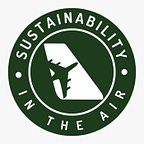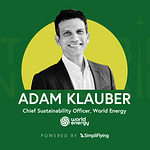In this episode of our ‘Sustainability in the Air’ podcast, Shashank Nigam, CEO of SimpliFlying, speaks with Sarah Ellerby, CEO of Nova Pangaea Technologies (NPT), a UK-based cleantech company that has created a patented technology called the REFNOVA®, to enable SAF production from agricultural and forestry waste.
Through their continuous proprietary REFNOVA®process, NPT converts non-food derived agricultural and woody biomass into bioethanol and biochar. The ethanol can then be used to produce SAF through the alcohol-to-jet (ATJ) pathway, while the biochar acts as a natural carbon removal product as it has fixed atmospheric CO2 from the original biomass.
NPT’s first waste-to-2G ethanol commercial-scale facility, called NOVAONE, plans to reach its Financial Investment Decision (FID) by the end of 2025.
Here are the key highlights of the conversation:
Understanding NPT’s REFNOVA® technology (7:20)
NPT’s approach to feedstock and outputs (10:55)
Project Speedbird and scaling production (11:50)
Challenges in funding SAF projects (14:25)
Scaling SAF projects and bridging the supply-demand gap (21:40)
Rapid Fire! (35:00)
Keep reading for a quick overview of the episode.
Why “waste-derived SAF” matters for the future of aviation
By utilising agricultural waste and wood residues, NPT addresses the challenge of finding sustainable feedstocks without competing with food crops or relying on limited resources. As Ellerby explains:
“We process agricultural wastes such as sugarcane bagasse, wheat straw, even as far as whiskey draff. So non-food derived feedstocks, woody residues, hard and soft woody residues, as well as wood waste.”
This approach not only provides a sustainable source for SAF but also helps solve waste management issues in the agricultural sector. By using REFNOVA® technology, NPT effectively transforms what would otherwise be waste into low-carbon fuel, avoiding competition with food crops, a criticism often levelled at first-generation biofuels.
However, it’s important to note that the scale of waste-derived SAF production is currently limited, and significant expansion would be necessary to make a substantial impact on aviation emissions. Moreover, the economic viability of large-scale production and the consistency of fuel quality across varying feedstocks require further demonstration.
Four ways Nova Pangaea Technologies is envisioning the future of SAF
1. Innovative REFNOVA® technology to solve feedstock challenges
Nova Pangaea Technologies’ REFNOVA® process is designed to convert various agricultural and woody wastes into precursors for SAF. The process consists of the following key steps:
Pre-treatment: This initial stage involves particle size reduction and washing of the raw materials.
Drying: Following pre-treatment, the feedstock undergoes a simple drying process to remove excess moisture.
Steam Assisted Rapid Pyrolysis (SARP®): This proprietary step is the core of NPT’s technology. The SARP® unit processes the prepared feedstock, separating the sugars from the lignin portion.
The REFNOVA® technology is designed to handle a wide range of non-food derived feedstocks, including sugarcane bagasse, wheat straw corn stover, and various wood residues. This flexibility allows the process to adapt to local agricultural waste streams and potentially mitigate seasonal variations in feedstock availability.
2. Multi-product output for enhanced sustainability
The REFNOVA® process yields two primary products: sustainable sugars called NOVASUGARS and biochar (NOVACHAR).
NOVASUGARS: The sugars extracted from the feedstock are classified as “non-food derived” or “second-generation” sugars. These are further processed through fermentation to produce lignocellulosic ethanol. This ethanol serves as a precursor for SAF production.
NOVACHAR: Biochar is produced as a co-product in the REFNOVA® process. Ellerby emphasises that biochar is not considered a byproduct, but a valuable output in its own right. Biochar can be used as a soil additive to enhance soil quality and serve as a peat alternative in horticulture. Moreover, it provides long-term carbon sequestration when applied to soil, potentially improving the carbon balance of SAF production.
The dual-product strategy could provide NPT with two separate revenue streams, potentially improving the economic viability of their process.
3. Strategic partnerships
Nova Pangaea Technologies has developed a network of strategic partnerships crucial for its development and scaling of SAF production. These partnerships span across investors, industry players, and technology providers.
In 2023, Project Speedbird, a joint partnership between NPT, LanzaJet and British Airways secured £9 million (€10.2 million) in UK government funding, with £7.5 million allocated specifically to Nova Pangaea Technologies. In this partnership, NPT provides the feedstock technology, British Airways commits to offtaking the entire allocation of SAF produced, and LanzaJet contributes its ATJ SAF technology.
Moreover, International Airlines Group (IAG), the parent company of British Airways, has also invested in NPT. NPT has also secured funding from Mercia Asset Management, Par Equity, and NPIF – Mercia Equity Finance, part of the Northern Powerhouse Investment Fund.
4. Addressing scaling and funding challenges
Addressing the challenges of funding SAF projects, Ellerby notes that constructing a SAF plant typically requires hundreds of millions in investment. She emphasises the need for a blended finance approach to bridge significant funding gaps.
“So we need government, we need alignment across the value chain, and blended finance of the public and private sector coming together.”
With the UK government aiming to have five SAF projects in construction by 2025, policy initiatives such as the UK SAF mandate and revenue certainty mechanism, which aim to mitigate market risks, are a necessary boost for the industry, says Ellerby. Without substantial financial backing and supportive government initiatives, the development and scaling of SAF technologies could face significant hurdles. Ellerby also underscores the importance of developing a skilled workforce and concerted efforts across the global value chain to promote SAF adoption.
‘Sustainability in the Air’ is the world’s leading podcast dedicated to sustainable aviation. Through in-depth conversations with top aviation leaders, we break through the clutter and provide a clear roadmap for a net-zero future.
For September 2024, we’re proud to feature Estuaire as our exclusive Sponsor of the Month. Estuaire is an aviation and climate data platform designed to help aviation brands make smarter, more informed decisions, especially when it comes to addressing non-CO2 impacts. Discover how they can support your sustainability goals.













